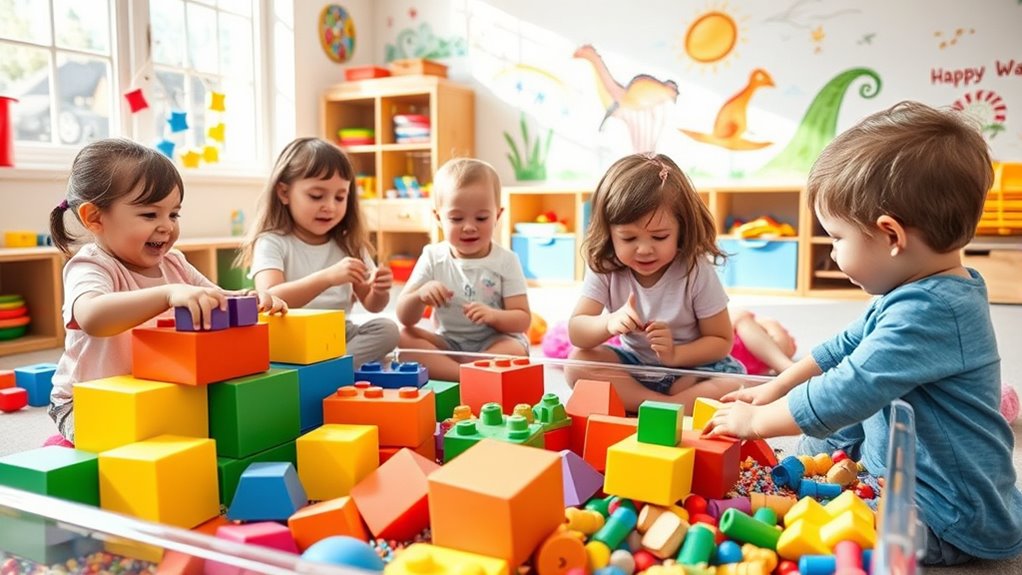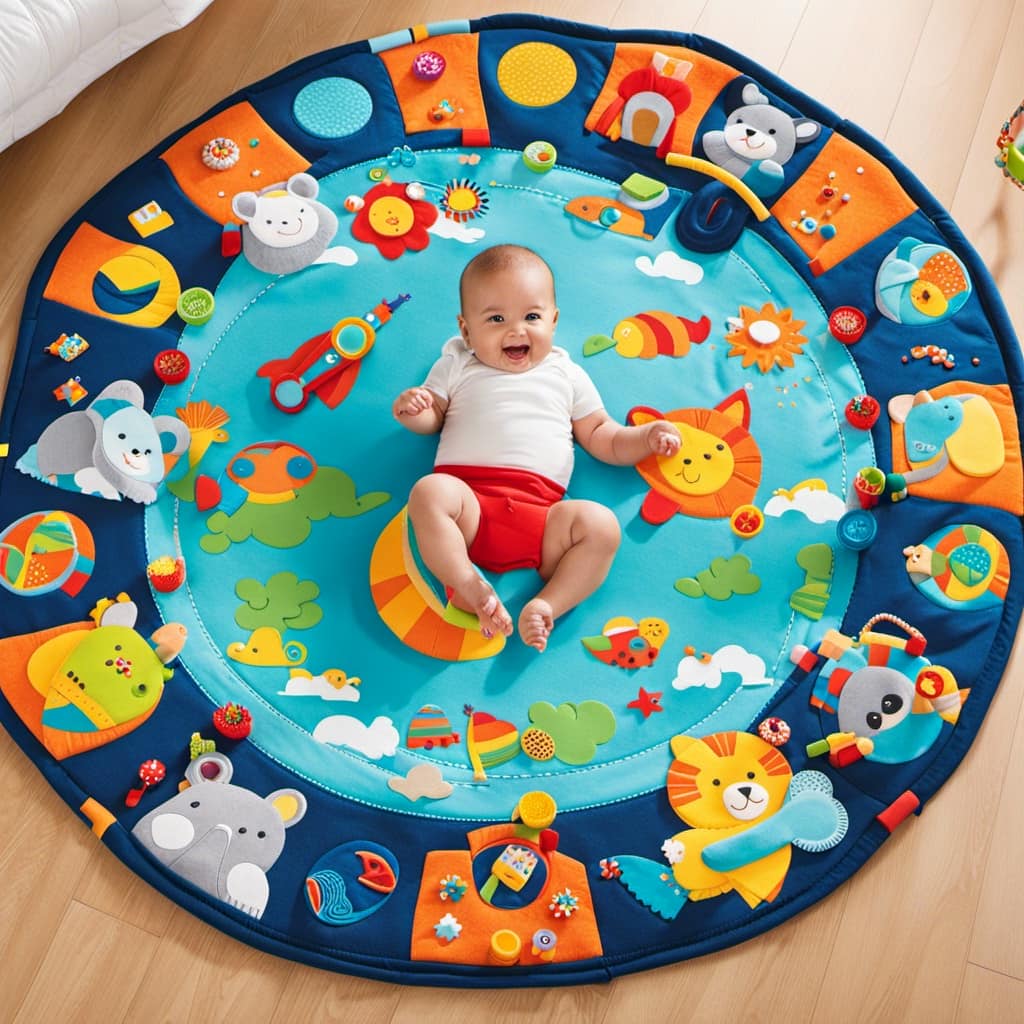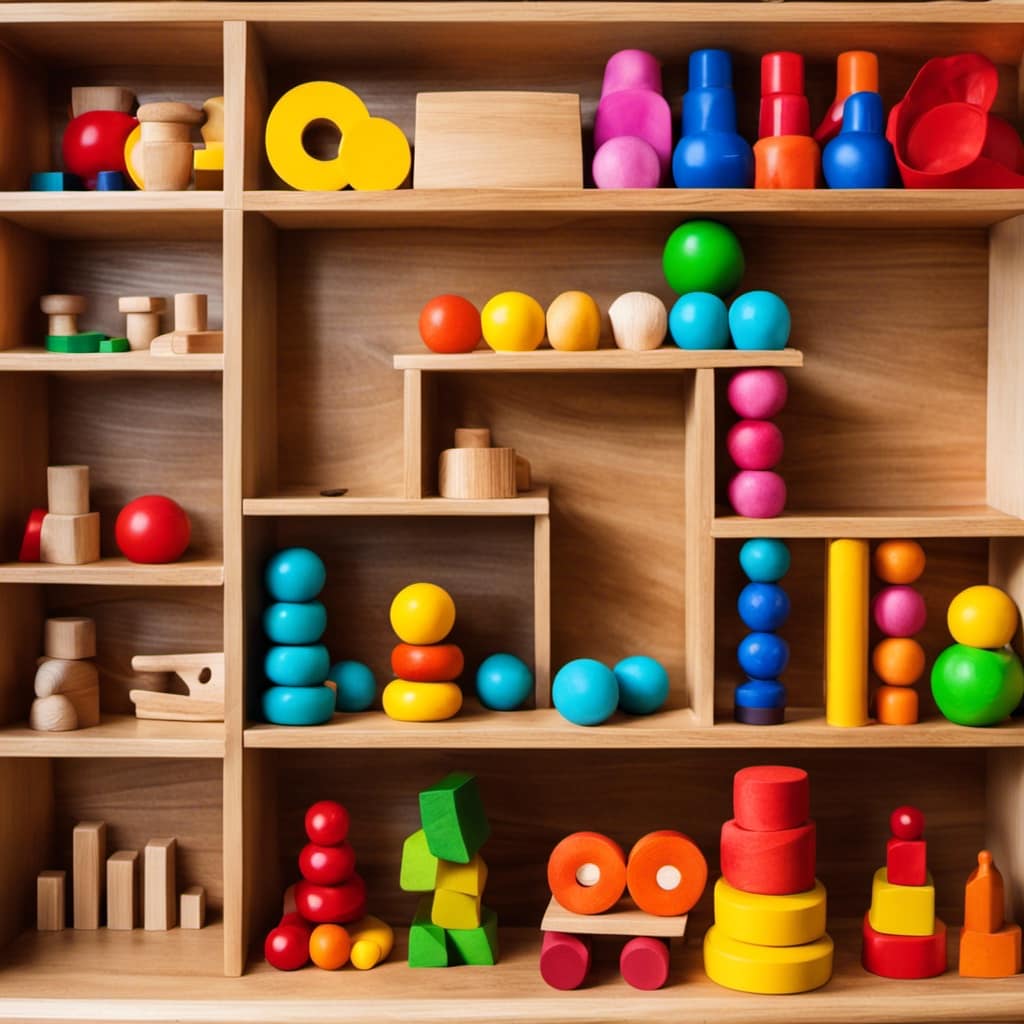Engaging in play helps your child develop essential skills by sparking curiosity and encouraging hands-on exploration. Through building, role-playing, and outdoor activities, they boost problem-solving, social skills, and confidence. Play also makes learning enjoyable, motivating children to persist through challenges and take risks. As they experiment and interact, they build neural pathways supporting lifelong learning. Keep exploring how different play types can enhance your child’s growth and love for learning.
Key Takeaways
- Play ignites curiosity and enhances brain development through hands-on exploration and experimentation.
- It promotes critical thinking, problem-solving, and understanding of abstract concepts via tangible experiences.
- Play-based activities develop social skills, language, and emotional resilience through peer interaction and role-playing.
- Engaging in play increases motivation, persistence, and confidence, making learning enjoyable and meaningful.
- Overall, play fosters cognitive, social, and emotional growth, laying a strong foundation for lifelong learning.

Have you ever wondered how children learn best? The answer often lies in the natural, engaging method of play. When you incorporate play-based activities into a child’s daily routine, you tap into their innate curiosity and desire to explore. These activities aren’t just fun; they’re powerful tools that substantially boost cognitive development. Play provides children with opportunities to experiment, problem-solve, and imagine, all of which are essential for developing critical thinking skills and understanding the world around them. As children interact with toys, peers, and their environment during play, they process new information, form connections, and strengthen neural pathways. This active engagement helps solidify learning in a way that passive instruction simply can’t match.
Play-based activities ignite curiosity, boost brain development, and foster critical thinking through hands-on exploration and social interaction.
By encouraging play-based activities, you’re offering children a chance to learn at their own pace, making learning more meaningful and memorable. For example, building blocks aren’t just about stacking; they help children grasp concepts of balance, size, and spatial relationships. When kids role-play as shopkeepers or doctors, they’re practicing social skills, language, and decision-making, all while having fun. These activities foster cognitive development by challenging children to think creatively and adapt to new situations. As they navigate these scenarios, they learn cause-and-effect relationships and develop problem-solving strategies. This hands-on approach makes abstract concepts concrete, helping children understand complex ideas through tangible experiences. Additionally, engaging in outdoor play can enhance sensory development and physical coordination, further supporting their overall growth.
In addition, play-based learning nurtures a child’s natural motivation. When children are engaged in activities they enjoy, they’re more likely to persist through challenges and develop a positive attitude toward learning. It also encourages independence, as kids make choices about what to play with and how to approach tasks, fostering confidence and self-regulation. As you observe children during play, you’ll notice their language skills flourish—they ask questions, describe actions, and negotiate with peers. These interactions are vital for social-emotional growth, but they also support cognitive skills like memory, attention, and reasoning.
Ultimately, integrating play-based activities into early learning creates a balanced approach that respects a child’s natural development process. It emphasizes discovery, experimentation, and joy—making learning feel less like a chore and more like an adventure. By prioritizing play, you’re laying a strong foundation for lifelong learning, curiosity, and resilience. When children are encouraged to explore through play, they not only develop essential skills but also cultivate a love for learning that can last a lifetime.
Frequently Asked Questions
How Does Play Influence Long-Term Academic Success?
You might wonder how play influences long-term academic success. Play enhances memory by helping you process and retain information more effectively. It also boosts social skills, teaching you cooperation, communication, and conflict resolution, which are essential for classroom success. Engaging in play helps build a strong foundation for learning, making you more adaptable and confident in academic settings. Overall, play sets the stage for sustained success throughout your educational journey.
What Types of Play Are Most Effective for Different Ages?
You should focus on age-appropriate play to support development. For infants, sensorimotor play like exploring textures and objects boosts sensorimotor development. As children grow, social interaction through role-playing or team games enhances social skills and cognitive growth. For preschoolers, imaginative play fosters creativity, while older kids benefit from strategic games that challenge reasoning. Tailoring play types to age ensures ideal skill development and keeps children engaged and learning effectively.
Can Play Help Children With Learning Disabilities?
You might wonder if play can help children with learning disabilities. Absolutely, it can. Play therapy offers a safe space for kids to express emotions and develop skills, while sensory play engages their senses, helping improve focus and coordination. These methods support their unique needs, fostering confidence and progress. By incorporating play therapy and sensory play into their routine, you give children valuable tools to overcome challenges and thrive.
How Do Cultural Differences Affect Play-Based Learning?
You might notice that cultural differences influence play-based learning by shaping cultural norms and play preferences. These norms determine what children see as appropriate or engaging, affecting their willingness to participate. For example, some cultures emphasize group activities, while others favor individual play. Understanding these differences helps you create inclusive play environments that respect diverse backgrounds, fostering better learning and social development through culturally sensitive play experiences.
What Role Do Parents and Teachers Play in Facilitating Play?
You play a vital role in facilitating play by engaging actively with children and encouraging exploration. Parent involvement and teacher strategies both support this process, helping children develop social, cognitive, and motor skills. As a parent or teacher, you create a safe, stimulating environment, ask open-ended questions, and provide opportunities for creative play. Your encouragement and guidance foster a love for learning through play, setting a strong foundation for future success.
Conclusion
Just as the young Mozart’s melodies blossomed through playful exploration, your child’s learning thrives when play is part of the journey. Embrace play as your secret weapon, turning everyday moments into magical opportunities for growth. Remember, the greatest discoveries often come when joy leads the way. By nurturing play, you’re revealing a world of endless potential—making learning an adventure as timeless as the stories of old.











